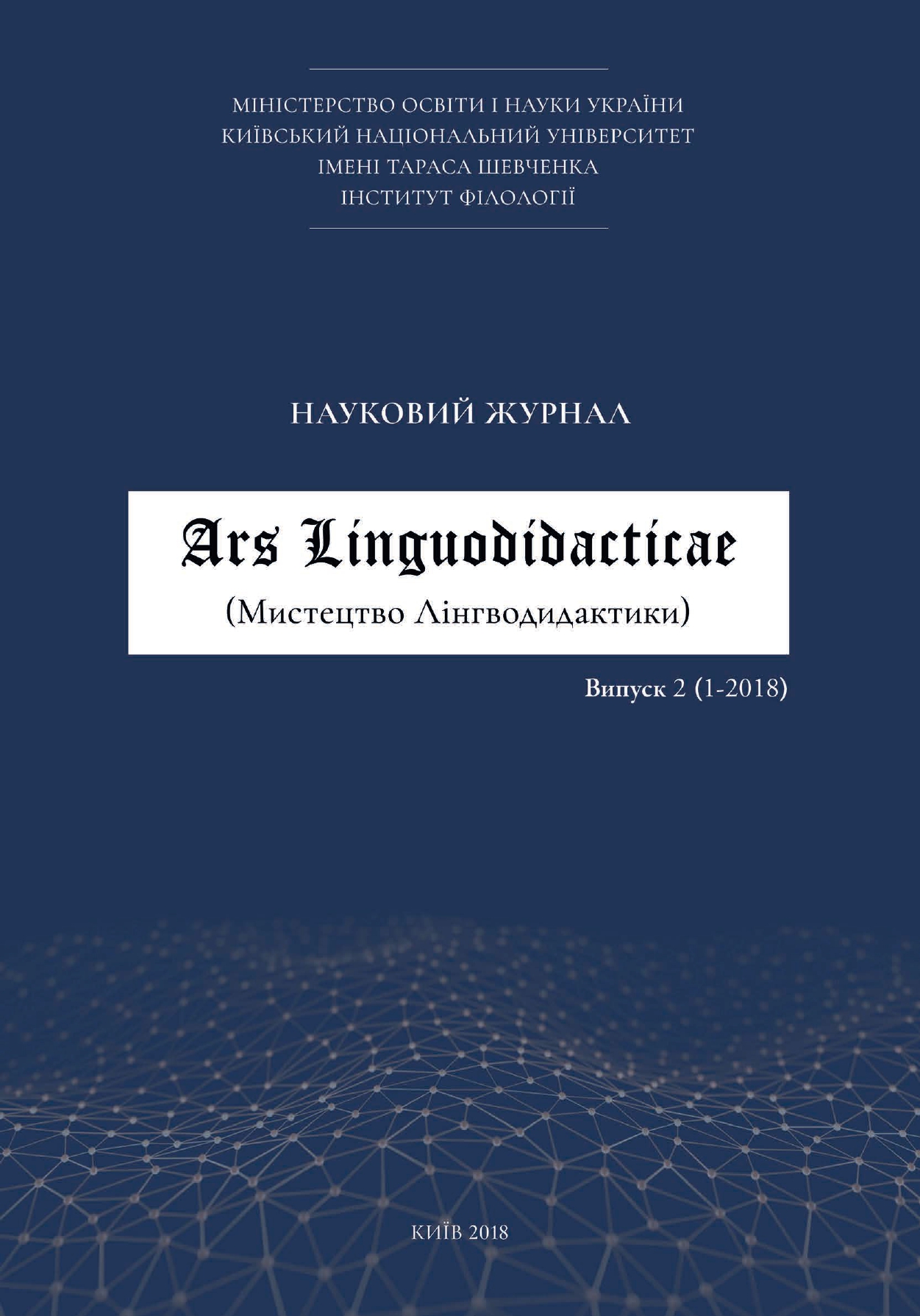TEACHING PUBLIC SPEAKING TO PHILOLOGY MAJORS: ORGANIZING THE PROCESS
DOI:
https://doi.org/10.17721/2663-0303.2018.2.09Keywords:
public speaking, monologue, persuasive strategy, argumentative technique, emotive technique, value-based technique, model of teachingAbstract
Background: Developing speaking skills has always occupied a prominent place in foreign languages programmes. But nowadays, mastering public speaking has become an urgent need for Philology majors. It is therefore timely to research the communicative strategies used in public speeches and suggest the model for teaching public speaking to undergraduate students.
Purpose: The purpose of the article is to characterise public speeches as samples of English persuasive speaking and develop the model for teaching public speaking to Philology majors.
Results: Public speaking employs persuasion as a key communication strategy. The persuasive strategy is realized through argumentative techniques (explaining logically the subject matter and encouraging the communication partner to accept necessary ideas), emotional techniques (creating the appropriate atmosphere and affecting the audience emotionally), value-based techniques (used to convince the audience by providing an assessment of the event).
The article differentiates the types of public speeches (inspiring speeches, propaganda, persuasive speeches) in the political and mass media contexts. In the process of training, students are supposed to master effective argumentative, emotive and value techniques as well as relevant verbal, nonverbal and paraverbal communication means to produce public speeches in English.
Discussion: Public speeches have been identified as effective material to teach persuasive speaking to Philology majors. The model of teaching public speaking to undergraduate students has been discussed.References
Martynova R. (2004). Tsilisna zahal’nodydaktychna model zmistu navchannya inozemnykh mov (Мартинова Р.Ю. Цілісна загальнодидактична модель змісту навчання іноземних мов). Kyiv: Vyshcha shkola. Print.
Mayyer N. (2011) Model organizatsiyi navchalnoho protsesu dlya samostiynoho ovolodinnya frankomovnym dilovym pysemnym spilkuvannyam maybutnimy dokumentoznavtsyamy z vykorystannyam dystantsiynykh tekhnolohiy. (Майєр Н. Модель організації навчального процесу для самостійного оволодіння франкомовним діловим писемним спілкуванням майбутніми документознавцями з використанням дистанційних технологій). Osvita rehionu: politolohiya, psykholohiya, komunikatsiyi. № 5. Web. 04 Aug. 2017.
Plestsova, Tatiana Alekseevna (2007). Formyrovanye umeniy publychnoho vystupleniya na professyonalnuyu temu: angliyskiy yazyk, neyazykovoy vuz, prodvynutiy etap obuchenyya (Плесцова Т.А. Формирование учений публичного выступления на профессиональную тему: английский язык, неязыковой вуз, продвинутый этап обучения). Diss. Moscow State Linguistic U. Abstract. Print.
Sternyn I.A. (2011). Praktycheskaya rytoryka v obyasneniyakh i uprazhnenyyakh dlya tekh, kto khochet nauchytsya govoryt (Стернин И.А. Практическая риторика в объяснениях и упражнениях для тех, кто хочет научиться говорить). Voronezh: Іstoky, Print.
Shchukyn A. N. (2004). Obuchenye ynostrannym yazykam: teoriya i praktika (Щукин А.Н. Обучение иностранным языкам: теория и практика). Moscow: Fylomatys, Print.
Zabolotna, Maryna Ihorivna. (2015) Metodyka navchannya audiyuvannya anglomovnykh publitsystychnykh tekstiv starshoklasnykiv v umovakh profil’noho navchannya (Заболотна М.І. Методика навчання аудіювання англомовних публіцистичних текстів старшокласників в умовах профільного навчання). Diss. Taras Shevchenko National University of Kyiv. Print.
Zahalnoyevropeyski rekomendatsiyi z movnoyi osvity: vyvchennya, vykladannya, otsinyuvannya (2003). (Загальноєвропейські рекомендації з мовної освіти: вивчення, викладання, оцінювання). Kyiv: Lenvit, Print.
Downloads
Published
How to Cite
Issue
Section
License
Copyright (c) 2018 Світлана Білоус

This work is licensed under a Creative Commons Attribution-ShareAlike 4.0 International License.
This work is licensed under a Creative Commons Attribution-NonCommercial 4.0 International License.
Copyright policy according to the terms of the license: Creative Commons "Attribution-NonCommercial" 4.0 International (CC BY-NC 4.0).
Authors who publish their articles in "Ars Linguodidacticae" (Open Access Journal) retain the following rights:
- The authors retain the copyright of their article and grant the Ars Linguodidacticae journal the right to first publish the manuscript of their article under the Creative Commons (CC BY-NC 4.0) Attribution License, which allows others to freely distribute the published work with mandatory reference to the author of the original work and first original publication in the Ars Linguodidacticae journal. An indication of the retention of the copyright of the work is provided on the title page of the article.
- The authors reserve the right to enter into separate contracts for the non-exclusive distribution of their article as published in Ars Linguodidacticae (e.g., placing the article in electronic libraries, archives and catalogs or publishing it as part of institute collections and monographs), provided that a full reference to the first original publication in Ars Linguodidacticae is given.
- The policy of the "Ars Linguodidacticae" journal allows and encourages authors to post a manuscript both before and during editorial processing, as this promotes productive scientific discussion and has a positive effect on the speed and dynamics of citing the article.
The editorial board reserves publishing rights to:
- the collated original articles and to the entire issue of the journal.
- the design of the journal and original illustrative and supplementary materials.
- the reprint reprints of the Journal in printed and electronic form.
The copyright policy is carried out according to the terms of the license: Creative Commons "Attribution-NonCommercial" 4.0 International (CC BY-NC 4.0).
For more information, please read the full text of the CC BY-NC 4.0 Public License.
Creative Commons Attribution-NonCommercial 4.0 International License.


